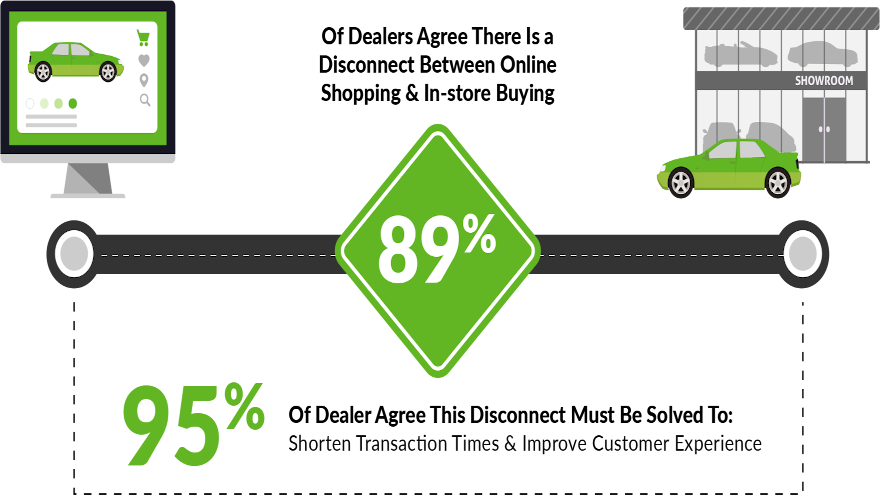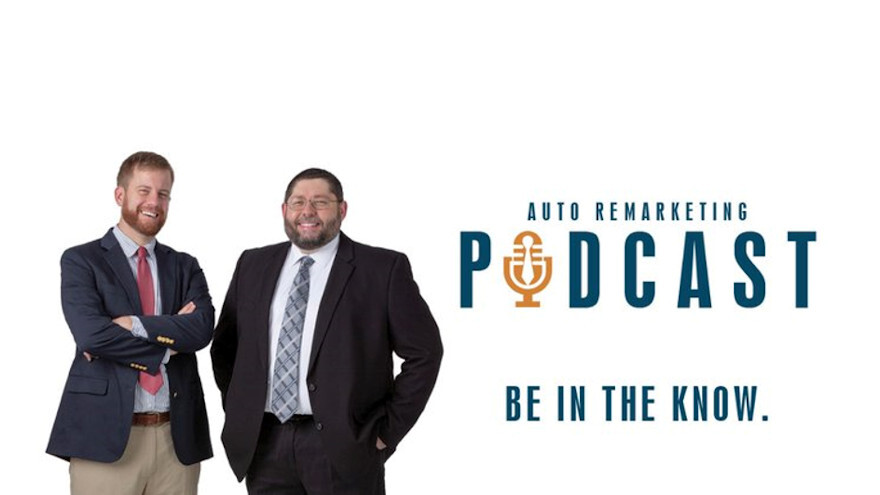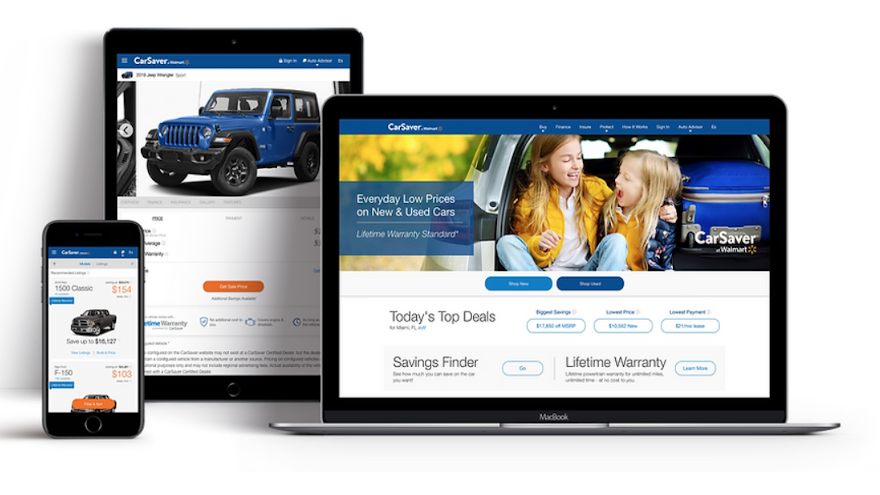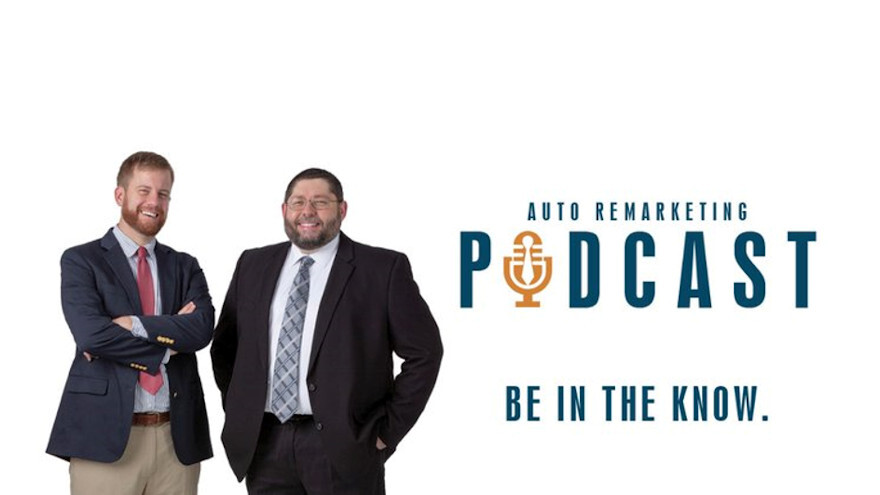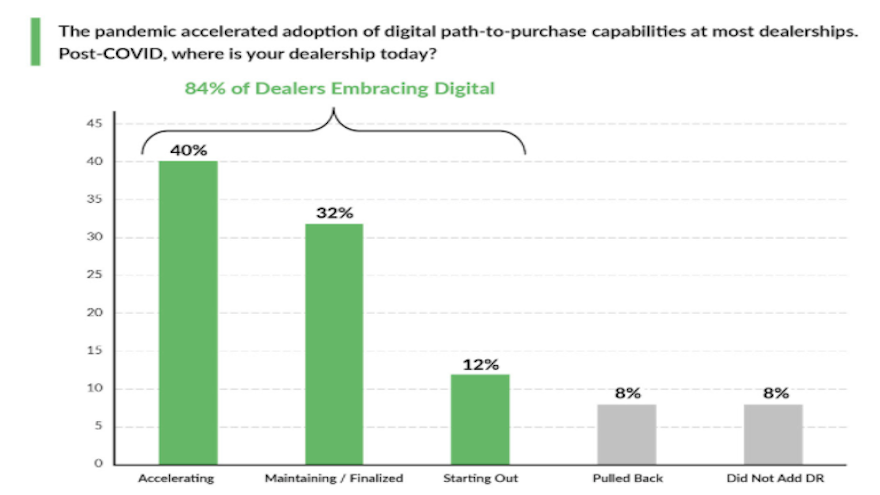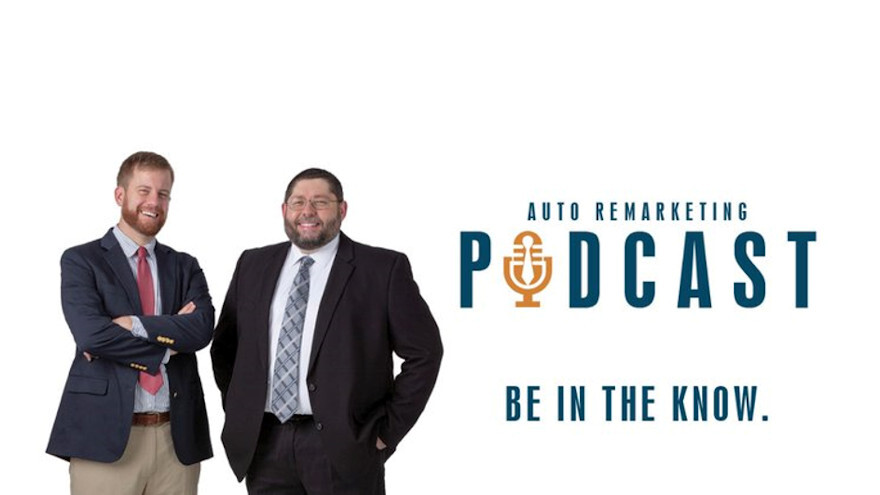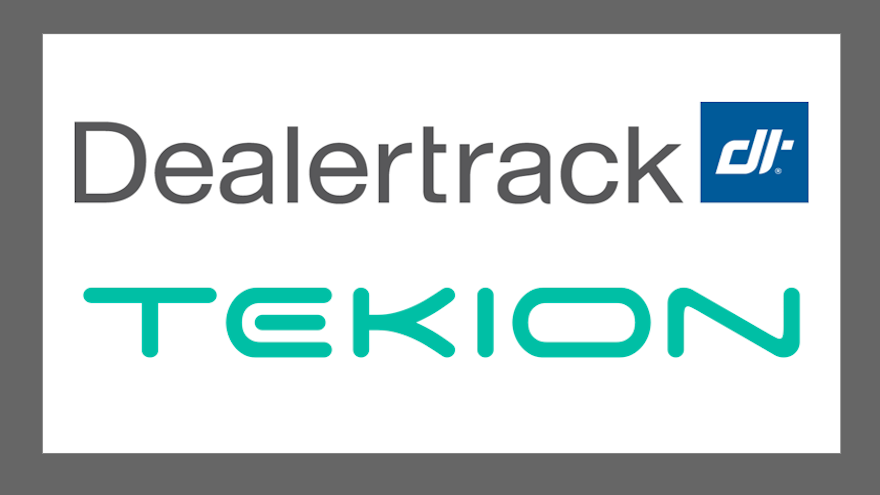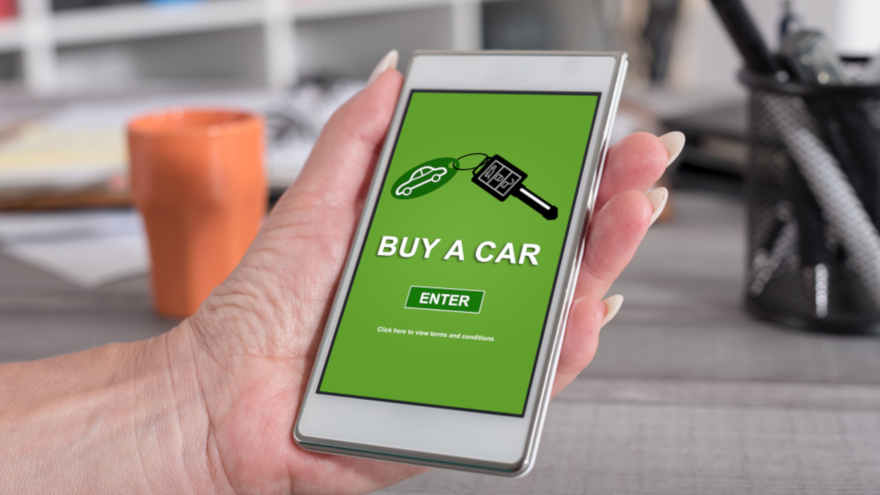Dealerships agree that there are problems with the digital retailing of used and new vehicles.
How to smooth out those issues is where stores are not yet in agreement.
A new dealer survey from eLEND Solutions confirmed that dealerships are experiencing a significant disconnect between the online and in-store process; one that they agree must be solved to shorten transaction times and improve the customer experience.
But, while the majority indicate that digital retailing offers a solution by speeding up steps in the traditional sales process, the survey results showed that dealers remain reluctant to fully embrace digital retailing.
The snapshot survey was fielded by eLEND Solutions among dealers in February to find out why time spent by customers with the auto dealership has only decreased by five minutes in the past five years, as reported by Cox Automotive.
Pete MacInnis, the chief executive officer and founder of eLEND Solutions, pointed out the survey results surfaced even as adoption of digital retailing buying experiences has increased as a result of the pandemic.
“We were stunned at this small reduction in the amount of time spent in the dealership over the past years,” MacInnis said in a news release. “As our survey indicates, the disconnect between the online and instore process, and the lack of more holistic digital retailing adoption — especially when it comes to digital finance — is hampering process efficiency.
“This continues to stand in the way of auto dealers and consumers realizing DR’s true benefits,” he continued.
MacInnis noted that, in the survey, the vast majority of dealers agreed that unrealistic initial finance terms presented online can slow the process down, but that if more realistic payment terms were initially presented online, 60 minutes-plus could be knocked off the transaction time.
MacInnis said this metric is significant given that 53% of dealers think that less than 20% of the sales process should be devoted to negotiations and final terms of finance.
However, when it comes to a capability that could help solve the issue of unrealistic terms — customer information such as driver license verification, credit application data, credit data and supporting documents being submitted online — the survey showed that more than half of participating dealers think that 80% of that information should only be submitted in-store.
Similarly, eLEND Solutions discovered that one in two dealers think that 80% of traditional in-store processes should remain exclusively in-store versus online. Less than one in three think that 40% or more of traditional in-store processes should be enabled online via digital retailing.
“Car buyers who engage digitally are more satisfied with the overall purchase experience and the time spent transacting, yet dealers remain ‘disconnected’ about digital retailing disconnects,” MacInnis said.
“Until auto dealers have access to, and the will to fully embrace, tools and processes that are able to solve information disconnects from online to instore, it is unlikely that the time spent in the dealership is going to improve any time soon,” he went on to say.
Other key survey takeaways include:
• 89% of dealers agree that there is disconnect between online shopping and instore buying
• 95% of dealers agree that this disconnect must be solved to shorten transaction times and improve customer experience
• 95% of dealers believe that digital retailing eliminates/speeds up many of the steps in traditional sales process
• 64% believe 20% or less of the traditional in-store sales processes are now handled through online digital retailing in dealerships who are using DR, with only 25% saying over 40%
• 50% of all surveyed dealers think that 80% of traditional in-store processes should remain exclusively in-store. Less than 1 in 3 think at least 40% of traditional in-store processes should be enabled online via DR.
• 54% think that that 80% or more of all required customer information/supporting documentation should only be submitted in-store; only 29% say that over 40% should be able to be submitted online
• 96% believe that unqualified or unrealistic payment terms presented to consumers online negatively impact the efficiency and timeline, i.e. time spent on the transaction, of the car buying process
• Majority agree that transaction times can be dramatically accelerated if realistic terms are presented
• 95% say that at least 30 minutes could be knocked off transaction times, with 58% saying an hour or more could be saved.
• 53% of dealers think that less than 20% of the sales process should be devoted to negotiations and final terms of finance.
MacInnis offered more insight about this survey during an episode of the Auto Remarketing Podcast recorded during NADA Show 2022. The episode is available below.
Our series of podcasts originating from this year’s Vehicle Finance Conference in Las Vegas orchestrated by the American Financial Services Association continues with a conversation featuring one of the previous Women in Auto Finance honorees, Jenn Reid.
Reid is now head of sales for digital lending and motor vehicles for Wolters Kluwer. She shared what’s intriguing her most about auto financing nowadays as well as what continues to fuel her passion for the industry.
To listen to this episode, click on the link available below, or visit the Auto Remarketing Podcast page.
Download and subscribe to the Auto Remarketing Podcast on iTunes or on Google Play.
Cox Automotive announced enhancements to Remote Signing on Dealertrack Digital Contracting, and dealership clients already are seeing benefits when catering to vehicle buyers who want to take delivery as quickly as possible.
Mark Garcia is F&I manager at Nissan of Boerne in Boerne, Texas, which is located about 30 miles northwest of San Antonio.
“Remote Signing has significantly improved our workflow and customer experience,” Garcia said in a news release from Dealertrack. “The process is seamless and allows us to focus on the deal without having to stop and walk customers through signing.
“Our customers can review and sign at their convenience, even on their phones, so it’s quick and easy for them,” Garcia continued. “And with compliance obligations like eSign consent and all transaction touchpoints recorded, there’s less for us to worry about.”
As the Texas dealer recapped, the latest move is an expansion of Cox Automotive’s digital retailing portfolio of solutions. Remote Signing is designed to deliver a more efficient, secure, easier digital experience anytime, anywhere — no matter how a consumer chooses to buy.
Enhanced Remote Signing is geared to equips dealers with a variety of secure and convenient features, including:
— Multifactor authentication: Starts with an email to the consumer, triggering a SMS text to obtain a passcode. With this verification, the signing process can begin securely.
— Signing initiation: Provides an email to the consumer to begin the remote signing process so that buyer consent is captured for all signing instances. In addition, each activity in the transaction is logged within an audit trail.
— Review copy: Enables the consumer direct access prior to signing to review with consent and activity being captured in the audit log.
— Audit log: Provides visibility into the trail of consumer and dealer activities including MFA, consent, review and signatures.
— Signing device: Expanded to flex the process across mobile phone, tablet and desktop.
— Contract package delivery to consumer: The consumer receives a link (active for 30 days) to print and download final documents.
— Signing room: Requires all consumer signers to sign remotely if the signing begins remotely for one, which is captured in the audit log.
“Consumer shopping and buying preferences have evolved, with 76% of consumers open to the idea of buying a car completely online. The easier we make the experience the more likely consumers are to embrace this evolution. Dealers and lenders are seizing the opportunity by shifting even more processes to a fully digital workflow that customizes the consumer experience,” said Kait Gavin, vice president of operations for Dealertrack F&I Solutions at Cox Automotive.
“Using a mobile phone or other device to search for a car has evolved to increased demand to complete even more steps digitally, including contract signing,” Gavin continued in the news release. “By giving consumers the ability to sign anywhere, on any mobile device, Remote Signing gives buyers the convenience they desire, and ensures contracts are more accurate, efficient and compliant for dealers and lenders.”
As Gavin mentioned, Cox Automotive said finance companies are also gravitating toward Remote Signing.
In fact, the company said 85% of finance companies that engage in Dealertrack Digital Contracting are now enabled for Remote Signing. That percentage is expected to grow to more than 90% in the next few months, according to the company.
Stemming from the Cox Automotive 2022 forecast, the automotive industry remains on a healthy course for this year. Experts projected there will be enough buyers in-market to support 16 million new-vehicle sales and 39 million used-vehicle sales.
However, Cox Autmotive acknowledged that a looming interest rate hike and continued pricing increases signal affordability issues for some consumers, who as a result, may need to explore several scenarios to get financed.
Cox Automotive pointed out that digital contracting and the ability to sign anywhere on any mobile device can open more financing channels, delivering an enhanced online car shopping and buying experience that reaches as many consumers as possible.
“Enhancing the Dealertrack platform was a natural step to meet lenders’ and dealers’ needs, and to future-proof business continuity and compliance as the car buyer journey continues to evolve,” Gavin said.
“Enabling Remote Signing — especially on mobile phones — is another example of how Cox Automotive is transforming retail transactions online and instore, with more eCommerce capabilities on the horizon,” she went on to say.
More information about Dealertrack Digital Contracting with Remote Signing is available via this website.
The tools also will be showcased at the upcoming NADA 2022 show.
For information on all Cox Automotive’s 2022 new offerings or to schedule a briefing with the team, visit this webpage.
CUNA Mutual Group and CarSaver entered into both working relationship as well as a financial commitment.
The financial services provider and the automotive e-commerce marketplace and fintech platform partnered last week to launch what they contend is the industry’s first online marketplace and fintech e-commerce platform for credit unions.
The platform is designed to enable members to buy, finance and insure new and used vehicles entirely online.
In addition to the newly formed partnership, a news release highlighted that CMFG Ventures — the venture capital arm of CUNA Mutual — invested substantial funds to fuel CarSaver’s growth.
According to Credit Union National Association’s Monthly Credit Union Estimates report, credit union members account for $407 billion in outstanding auto financing.
The reported also mentioned that an estimated 13.6 million credit union members qualify for an upgrade, which represents the potential to generate $476 billion in vehicles sales and new originations.
“The auto finance industry is going through a digital transformation, and it’s important for credit unions to lead in this space,” CUNA Mutual president and chief executive officer Bob Trunzo said in the news release. “CUNA Mutual’s commitment to driving digital innovation that enables seamless customer experiences has never been stronger.
“We believe that CarSaver’s technology can help give more members the opportunity to find the car and loan that will work best for their situation,” Trunzo continued. “The CarSaver technology is revolutionary, and their leadership team has deep industry experience and a track record of success. We’re excited about this relationship.”
The companies said credit union members will save time and money on the purchase and every vehicle comes with a lifetime warranty, covering major repairs for unlimited miles, at no cost to the customer, not even a deductible.
The companies explained CarSaver’s proprietary automated upgrade platform can identify the credit union’s members who qualify to upgrade to another vehicle for a lower monthly payment then links them to a personal portal where they can see their upgrade options.
With a click of a button, members can complete the entire transaction online and have the vehicle delivered directly to their home or pick up at a local certified dealer.
With the soaring demand for digital retailing solutions from consumers and lenders, CUNA Mutual and CarSaver said they will begin immediately accepting applications for credit unions and dealers to participate.
“CUNA Mutual works with 95% of the credit unions in the U.S. and has been helping them serve their members for 80 years,” said Chad Collier, co-founder and CEO of CarSaver.
“As they have done in the past, CUNA Mutual is helping credit unions future-proof their business while saving their members time and money, by digitally transforming the entire experience of buying, selling, financing, insuring and upgrading cars, 100% online,” Collier went on to say.
For more information, visit CarSaverCommerce.com.
Auto finance executive and entrepreneur Brian Reed remembers the scene at one of his first industry jobs. On Monday mornings, baskets below fax machines would be overflowing with paper applications from dealerships arriving over a weekend that needed to be processed by hand.
Now as chief executive officer at Digital Auto Advisors, Reed took us on a journey in this episode of the Auto Remarketing Podcast from those stacks of paper applications to online platforms aimed at rendering underwriting decisions as soon as the consumer hits that submit button.
To listen to the episode, click on the link available below, or visit the Auto Remarketing Podcast page.
Download and subscribe to the Auto Remarketing Podcast on iTunes or on Google Play.
The title of a new report from eLEND Solutions included a question likely being pondered by dealerships and finance companies, “In the Post-Pandemic New Normal, Where Does Digital Retailing End?”
The automotive fintech innovator highlighted that digital retailing capabilities continue to march forward for 84% of auto dealers, but that end-to-end DR adoption is stopping short of full implementation for the majority.
Read more
Sanjiv Yajnik, the president of financial services at Capital One, shared high praise for how well dealerships have navigated through the pandemic and adjusted to a retail environment driven by digital advancements.
In this episode of the Auto Remarketing Podcast, Yajnik also discussed what could be impacting auto financing for the rest of the year and beyond.
To listen to the episode, click on the link available below, or visit the Auto Remarketing Podcast page.
Download and subscribe to the Auto Remarketing Podcast on iTunes or on Google Play.
Service providers are continuing to respond to the challenge of meeting dealership demand to improve digital retailing capabilities their customers want.
On Tuesday, Dealertrack F&I and Tekion today announced the launch of a new digital contracting integration between the two platforms designed so users can deliver an improved digital vehicle-buying experience.
According to a news release, dealerships using Tekion’s Automotive retail cloud platform can complete the entire deal process digitally in one system — providing greater ease with less effort.
In fact, Dealertrack data showed 75% of all digital contracting deals delivered in May utilized DMS integrations to import deal data into their F&I workflow.
“Seamless integration between systems is so important in today’s automotive retail environment,” said Guru Sankararaman, chief financial officer and vice president of operations at Tekion. “We’re happy to work with Dealertrack F&I to improve the buying experience and increase operational efficiency for dealers.”
Dealertrack F&I and Tekion explained that systems lacking integrations cause inefficiencies that can hamper a dealership’s profitability. The firm also pointed out that disconnected systems too often require dealership staff to manually input customer and deal information multiple times, creating a longer process to electronically contract.
With this new integration, Dealertrack F&I and Tekion said dealerships can now provide customers with a frictionless online and in-store purchasing experience. Retailers are able to save time and cut down on manual paperwork — from credit application to contract submission — including the ability to remotely sign paperwork.
“Dealertrack is dedicated to open integration because streamlined digital workflows are essential to today’s online car shopping experience for retailers and buyers alike,” said Kait Gavin, vice president of dealer services at Dealertrack F&I Solutions.
“Together, Dealertrack F&I and Tekion can enable more dealerships who are looking to stay ahead of the competition,” said Gavin, who added the new digital contracting process complements the digital retailing integrations available to Tekion clients that can provide dealerships with “all the tools needed for a fully online vehicle-buying experience.”
A new partnership involving eLEND Solutions and Orbee is designed to keep shoppers already engaged with a dealership website moving down the purchase funnel.
The fintech companies highlighted the integration of Orbee’s platform — which leverages data to provide in-depth, individual shopper profiles — with eLEND’s Express Credit App, a quick online finance application that can deliver instant credit decisions, to offer dealerships a solution that can enable them to automatically re-target potential car-buyers who have started, but not completed, their credit application.
“Increased engagement leads to greater conversion opportunities for car dealers,” eLEND Solutions chief executive officer and founder Pete MacInnis said in a news release. “Our partnership with Orbee further fuels Express Credit App’s already industry leading click-to-submit ratio, moving more car shoppers down the purchase funnel, and dramatically improving dealership shopper to sales ratios.
“This is another critical step in moving digital retailing closer to its potential, helping to transform the dealer’s website from lead generator into deal generator,” MacInnis continued.
If a car shopper on a dealership website clicks through to eLEND’s Express Credit App, but then leaves the app before submission, the company explained the integration with Orbee enables the re-engagement of that customer via automated retargeting.
By leveraging shopper information Orbee has previously captured such as chat, trade-in tolls, price requests and more, it can retarget and lead the customer back to the Express Credit App. That customer-submitted personal identifiable information can enable the dealer to negotiate accurate payment terms matched to fundable contracts with consumers remotely.
“We are pleased to partner with eLEND to further empower dealership conversion rates,” Orbee chief revenue officer Peter Fong said. “Our goal is to make sure dealers can continue engagement, initiated through Express Credit App, with those car shoppers who start the credit process, but do not finish it.
“Through our proprietary targeting technology, we are able to re-capture their interest, encourage them to complete this important step in their car buying journey,” Fong went on to say.
Both fintech firms acknowledged the COVID-19 pandemic accelerated dealerships’ adoption of digital retailing tools, as more and more shoppers began their purchase process by going directly to dealership websites.
As this trend continues, they said powerful first-party data is available that can be harnessed to create continuity in the digital buying experience.
And that’s when the partnership of eLEND and Orbee can lead to sales victories for dealerships.
“The high lead-to-sales conversion ratio of eLEND’s Express Credit App means that these applicants are serious buyers and, with Orbee, we are able to ensure that even more of these car buyers who start online with a car dealership stay on the path to purchase with that dealership,” MacInnis said.
Autotrader acknowledged buyers are facing tough times right now, with a difficult market plagued by low supply from vehicle inventory shortages and the resulting high demand driving prices upward.
“A worldwide microchip shortage has severely limited new-car production and dealers have fewer used vehicles on their lots, so now more than ever car shoppers need to appreciate the power of their individual finances to make the best deal they can,” Autotrader said in a news release highlighting the launch of My Wallet, a tool designed to detail a consumer’s total purchasing power with personalized monthly payment details and the ability to compare deals to help make vehicle shopping easier, faster and more convenient from the comfort of home.
When making a large purchase decision like buying a vehicle, Autotrader stressed that consumers need to understand not only how it fits into the overall big picture of their finances but also how it impacts their monthly spending.
My Wallet can help guide shoppers through setting up their budget so they can get personalized pricing and monthly payment details as they browse, select and move toward a purchase, giving shoppers more accurate pricing than other listings providers.
To activate the power of My Wallet on Autotrader, shoppers can enter their individual purchase details, estimated credit score, desired term, down payment and trade-in value that is seamlessly generated through an integration with Kelley Blue Book’s KBB.com.
After setting up My Wallet, each vehicle listing they view on Autotrader will feature a personalized estimated monthly payment so they can clearly evaluate if that vehicle fits within their individual budget. My Wallet then can estimate payments with shoppers so they can easily browse a wide variety of vehicles across Autotrader as they move toward their purchase.
By empowering car shoppers with personalized payment details, My Wallet helps improve the shopping-to-buying journey and creates richer connections between buyers and sellers. Since the launch of My Wallet, Autotrader there has been a 113% increase in shoppers exploring financial terms of their deal on Autotrader, including things like down payment, monthly payment or contract term, and deal activity has increased by 469% .
“Consumers should have a comprehensive view of their total purchasing power as they consider their next vehicle, so being able to shop by monthly payment is extremely helpful — especially now given the current economic climate in the automotive industry,” said Jessica Stafford, president of Autotrader and Kelley Blue Book.
“Autotrader’s My Wallet gives car shoppers the best experience and most accurate ‘all-in’ pricing to help them complete their car-buying journey faster,” Stafford continued.
“Personalizing the shopping experience drives convenience that is beneficial to consumers and dealers alike, easing the flow of information and helping to close the gap between shopping and buying to provide a smooth, integrated experience all around,” she went on to say.
Beyond the benefits My Wallet affords consumers, the tool also aids dealers, according to the company.
When consumers shop online, price often is a deciding factor and 67% of shoppers are more likely to use the marketplace if they can shop by payment, Autotrader said.
Powered by Cox Automotive, My Wallet can generate the deal pieces earlier in the shopping journey, allowing consumers to determine their trade-in, down payment, financing terms and credit range on every vehicle listed on Autotrader.
“This information is combined with a dealer’s preferred lender, which ultimately provides dealers with more qualified leads and empowers them to service their customers in a more personalized, seamless way that is quicker to close the sale,” Autotrader said.
“With the drastic shift in the automotive consumer journey, being able to complete as much of the car shopping and buying process from home is now imperative for many consumers — and dealers have stepped up to the challenges of digital retailing accordingly,” the company continued. “Shoppers now know what is possible in this new car-buying experience and they are going to seek out dealers who continue to deliver that process, resulting in stronger loyalty to those brands and dealerships than ever before.
“Consumers of all ages have come to appreciate shopping and buying things online versus going to a retail store, and now many prefer and expect it. In addition to providing a resource for consumers to shop for the perfect vehicle by payment using My Wallet, the trust and speed of Autotrader’s digital shopping experience makes the overall car-shopping process a breeze,” Autotrader went on to say.

